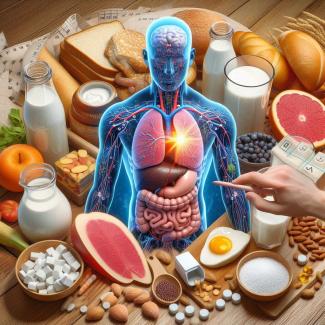
Signs of magnesium deficiency: Magnesium is an essential mineral that plays a crucial role in various bodily functions. When you're deficient in magnesium, your body may exhibit a range of symptoms. Some of the early signs of magnesium deficiency include:
- Muscle cramps and spasms: One of the most common early signs of magnesium deficiency is muscle cramps and spasms. These can occur in the legs, feet, or other areas of the body.
- Fatigue: Magnesium is involved in energy production, so a deficiency can lead to feelings of weakness and fatigue.
- Twitches and tremors: Involuntary muscle twitches or tremors, particularly in the eyelids or fingers, can be indicative of low magnesium levels.
- Nausea and vomiting: Some people with magnesium deficiency may experience gastrointestinal symptoms like nausea and vomiting.
- Loss of appetite: A lack of magnesium can lead to a diminished appetite or altered taste perception.
- Personality changes: Irritability and mood swings can be related to magnesium deficiency.
- Abnormal heart rhythms: Severe magnesium deficiency can lead to cardiac arrhythmias or irregular heartbeats.
- Numbness and tingling: Some individuals may experience numbness or tingling, often in the extremities.
- Weakness: Muscular weakness can be a symptom of magnesium deficiency.
- Difficulty swallowing: In rare cases, low magnesium levels can affect the muscles used for swallowing, causing dysphagia.
What is magnesium and why does the body need it?
Magnesium is an essential mineral that the body needs for various functions. It is involved in over 300 enzymatic reactions within the body, including:
- Energy production: Magnesium is a co-factor in the conversion of food into energy.
- Muscle function: It helps muscles contract and relax, making it essential for muscle health.
- Nerve function: Magnesium is crucial for proper nerve transmission.
- Bone health: It contributes to the maintenance of bone density.
- Heart health: Magnesium is important for regulating heart rhythm and blood pressure.
- Blood glucose control: It can influence insulin sensitivity and glucose metabolism.
- DNA and RNA synthesis: Magnesium plays a role in DNA and RNA production.
- Protein synthesis: It is involved in the creation of proteins in the body.
Testing for magnesium deficiency:
To determine if you are deficient in magnesium, you can undergo various tests:
- Blood tests: A blood test can measure the concentration of magnesium in your blood. However, only a small fraction of your body's magnesium is found in the bloodstream, so this test may not always reflect your overall magnesium status accurately.
- Red blood cell magnesium test: This test measures the magnesium levels within your red blood cells, providing a more accurate reflection of your magnesium status.
- Urine test: A 24-hour urine test can assess how much magnesium your body is excreting. This can be an indicator of magnesium deficiency if the excretion is unusually high.
- Magnesium loading test: This test involves administering a magnesium solution and measuring the amount excreted in urine to evaluate your magnesium retention.
It's essential to consult a healthcare professional if you suspect a magnesium deficiency, as they can recommend the appropriate tests and guide you on supplementation or dietary changes if necessary. Keep in mind that diagnosing magnesium deficiency can be complex, as symptoms may vary and can overlap with other medical conditions.






